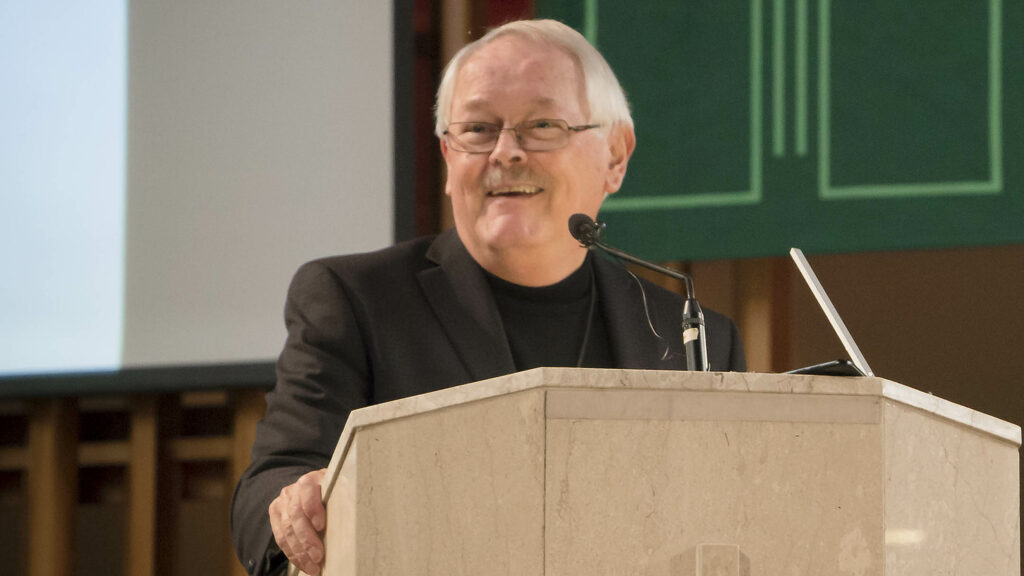Each year, I write a column sharing with readers the title and a brief synopsis of the ten books that touched me most that year. Occasionally, however, I judge a book to be exceptional enough to merit its own column. Robert Ellsberg’s new book, A Living Gospel – Reading God’s Story in Holy Lives, is such a book.
Robert Ellsberg is the publisher and editor-in-chief of Orbis Books and in that role has shepherded into print some of the more challenging spiritual writings of our generation. Among others things, he has edited the selected writings, diaries, and letters of Dorothy Day (whom he had the privilege of being in community with during the last five years of her life). But beyond publishing the thoughts of others, Ellsberg has himself, quietly, produced a huge treasury of writings on the lives of the saints. He has three major books on the lives of the saints (All Saints; The Saints’ Guide to Happiness; and Blessed Among Women) and, each day, writes an account of the life of a saint for the booklet, Give Us This Day.
Ellsberg is what’s technically termed a hagiographer, namely, someone who writes up the lives of various saints so that they may serve as inspirations for the rest of us. Anyone familiar with the history of Christian spirituality knows how important this has been. The Gospels themselves are, in a manner of speaking, hagiography, the life of Jesus written up for our inspiration and imitation. Then, in the early church, we have the lives of the martyrs and after that a parade of saints through medieval and modern times down to our own age. We’ve always been told the stories of the saints.
Many of us, I suspect, are familiar with Alban Butler’s classic, four-volume series, Lives of the Saints. These famous mini-biographies were published 200 years ago but they employed the literary genre of the time apposite to writing up the lives of saints. That genre, hagiography, on principle, distorted somewhat the literal reality so as to highlight essence and this often left the reader with the impression that the saints being described were devoid of normal human weakness and limitation. Our age no longer understands this and so a new kind of hagiography is needed, one that brings out essence without sacrificing the literal facts. Robert Ellsberg is that new kind of hagiographer and we need such hagiography today.
When I was young, the lives of the saints were one of the major ways within which spirituality was taught. We each had a patron saint, every city had a patron saint, every parish had a patron saint, we all read the lives of the saints and were inspired to higher ideals by the likes of saints such as Tarcisius, stoned to death for protecting the Blessed Sacrament; Marie Goretti, willing to die rather than sacrifice her personal integrity; St. George, who by the power of faith could slay dragons; and St. Christopher, whose providential eye could you keep you safe while traveling.
Of course, looking back, one can see now where those who wrote up these stories often took liberties with historical fact to highlight essence. Indeed, both St. George and St. Christopher are now relegated more to the realm of fable than fact. No matter, their stories, like those of the other saints we read, lifted our eyes a little higher, put a bit more courage in our hearts, gave us real life examples of Christian discipleship, and helped fix our eyes on what’s more noble.
Today we have a different version of the lives of the saints. The rich, famous, and successful have effectively replaced the saints of old. Butler’s Lives of the Saints has been replaced by People Magazine, biographies, television programs, and websites that picture and detail for us the lives of the rich and the famous. And these lives, notwithstanding the goodness you often see there, don’t exactly focus our eyes and hearts in the same direction as do the lives of Tarcisius, Marie Goretti, St. George, or St. Christopher. In a culture which deifies celebrity, we need some different celebrities to envy. Robert Ellsberg is pointing them out.
In this book, among other things, Ellsberg chronicles the lives of four contemporary “saints”, Dorothy Day, Thomas Merton, Henri Nouwen, and Charles de Foucault (none of whom are yet canonized or might ever be.) But, their lives, he believes, can help us define what following Jesus might mean inside the complexities of our own generation.
And this is true too for the Church as a whole. Commenting on the life of Charles de Foucauld, Ellsberg writes: “In an age when Christianity is no longer synonymous with the outreach of Western civilization and colonial power, the witness of Foucauld – poor, unarmed, stripped of everything, relying on no greater authority than the power of love – may well represent the future of the church, a church rooted in the memory of its origins and of its poor founder.”
The saints have something for everyone!

